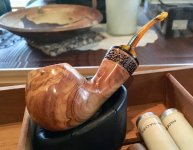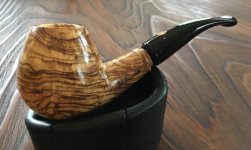I am new to pipe making, and I am trying a few woods types I have near by before I try my hand with Briar. I was wondering if a pipe made out of Crab Apple wood or Apricot wood would be safe to use. Also how are pipes finished? are waxes best when starting out or should oils/ or stains be used. Thank you for any input.
Pipe Materials
- Thread starter kwymanx5
- Start date
You are using an out of date browser. It may not display this or other websites correctly.
You should upgrade or use an alternative browser.
You should upgrade or use an alternative browser.
SmokingPipes.com Updates
Watch for Updates Twice a Week
I think that there are some forums just for pipemakers. They will best answer your questions. There are some here with very strong opinions about woods for making stummels, but they aren't as valid as you'll find in a forum specifically for pipemakers.I am new to pipe making, and I am trying a few woods types I have near by before I try my hand with Briar. I was wondering if a pipe made out of Crab Apple wood or Apricot wood would be safe to use. Also how are pipes finished? are waxes best when starting out or should oils/ or stains be used. Thank you for any input.
You have apricot trees with limbs large enough to turn a pipe? California? The limbs on my apricots are very twiggy.
Good luck.
Just as points of reference, possible alternatives to briar seem to be mountain laurel, maple, olive wood, and pear wood, and some lesser knowns. I have a pipe made of cocobolo which smokes well, but there are hazards working that wood because of the saw dust particulates that can irritate lungs. MM cob makes inexpensive and highly smokable pipes out of maple. Beechwood has been used by Stanwell for recent pipes.
Any wood is good if you're just practicing. ?
Thank you for the feedback, I am in Northern AZ. I will check out that forum and if it turns out I shouldn't be using these they will be good practice peace'sI think that there are some forums just for pipemakers. They will best answer your questions. There are some here with very strong opinions about woods for making stummels, but they aren't as valid as you'll find in a forum specifically for pipemakers.
You have apricot trees with limbs large enough to turn a pipe? California? The limbs on my apricots are very twiggy.
Good luck.
The advantage of briar, it seems to me, is that somewhere in your pipe making, when you hit the zone, you'll end up with a real keeper that will probably last a lifetime.
Any wood is good if you're just practicing. ?
Of all woods besides Mediterranean briar I think Osage Orange has to be the best choice.
Native Americans ate the seeds year round for Vitamin C, they made all their good bows from it, and I won’t allow any other kind of corner post on my farm be set but an Osage Orange, commonly known as hedge, or Bois D’Ark.
I had a machinist friend who used Osage Orange to turn replacement bearings for slow moving machines, instead of Babbitt metal.
And, many others have already turned pipes from it.
The disadvantages of Osage Orange for pipes, is that it’s plain, and will have some tiny pores that won’t work out.
The advantage of Osage Orange is that it’s about the densest, hardest and toughest wood I know of, it’s not poisonous, and full of sweet tasting resins and saps.
Native Americans ate the seeds year round for Vitamin C, they made all their good bows from it, and I won’t allow any other kind of corner post on my farm be set but an Osage Orange, commonly known as hedge, or Bois D’Ark.
I had a machinist friend who used Osage Orange to turn replacement bearings for slow moving machines, instead of Babbitt metal.
And, many others have already turned pipes from it.
The disadvantages of Osage Orange for pipes, is that it’s plain, and will have some tiny pores that won’t work out.
The advantage of Osage Orange is that it’s about the densest, hardest and toughest wood I know of, it’s not poisonous, and full of sweet tasting resins and saps.
Those are beautiful Oz!Until recently cherry wood was used a fair bit in France.
Pear wood pipes are quite common.
I have a couple of olive wood pipes with very nice grain. Waxed, unstained finish so the grain shows up well.
View attachment 114737View attachment 114738
The only thing I’ve carved besides briar is olive wood. Olive wood looks great with a linseed oil rub. I would just take a few samples and experiment. Also try darker dyes then sanding lightly to color the grain and then applying a lighter dye (on briar- not olive). Pipe makers forum site has an alternative materials section you might check outI am new to pipe making, and I am trying a few woods types I have near by before I try my hand with Briar. I was wondering if a pipe made out of Crab Apple wood or Apricot wood would be safe to use. Also how are pipes finished? are waxes best when starting out or should oils/ or stains be used. Thank you for any input.







